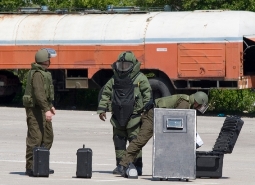How to Handle a Bomb Threat
The Bureau of Alcohol, Tobacco and Firearms tells us the two most common reasons for reporting a bomb threat are:
-
The caller has definite knowledge or believes that an explosive or incendiary bomb has been, or will be, placed and he/she wants to minimize personal injury or property damage. The caller may be the person who placed the device or someone who has become aware of such information.
-
The caller wants to create an atmosphere of anxiety and panic which will, in turn, result in a disruption of the normal activities at the facility where the device is purportedly placed. Whatever the reason for the report, there will certainly be a reaction to it. Through proper planning, a wide variety of potentially uncomfortable reactions can be greatly reduced.
Handling Bomb Threats
-
Keep the caller on the line as long as possible.
-
Record every word spoken by the caller.
-
Ask where the bomb is and what time the bomb is going to go off.
-
Pay attention to background noise.
-
Listen closely to the voice (male or female), voice quality (calm or excited), accents and speech impediments.
-
Do not hang up the phone.
-
Immediately report the call to the management person designated to receive such information.
-
Turn off all portable radios and cellular phones.
Characteristics of a Parcel Bomb
-
Restricted endorsements, such as “Personal” or “Private”.
-
Names or titles that are inaccurate.
-
Homemade labels or cut and paste lettering.
-
Protruding wires, tinfoil or oily stains.
-
Excessive postage.
-
Rigid feeling or uneven appearance.
-
Unprofessionally wrapped using masking tape or string.
-
Endorsed with “Fragile,” “Rush” or “Do Not Delay.”









